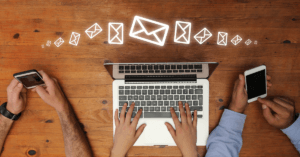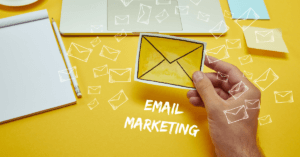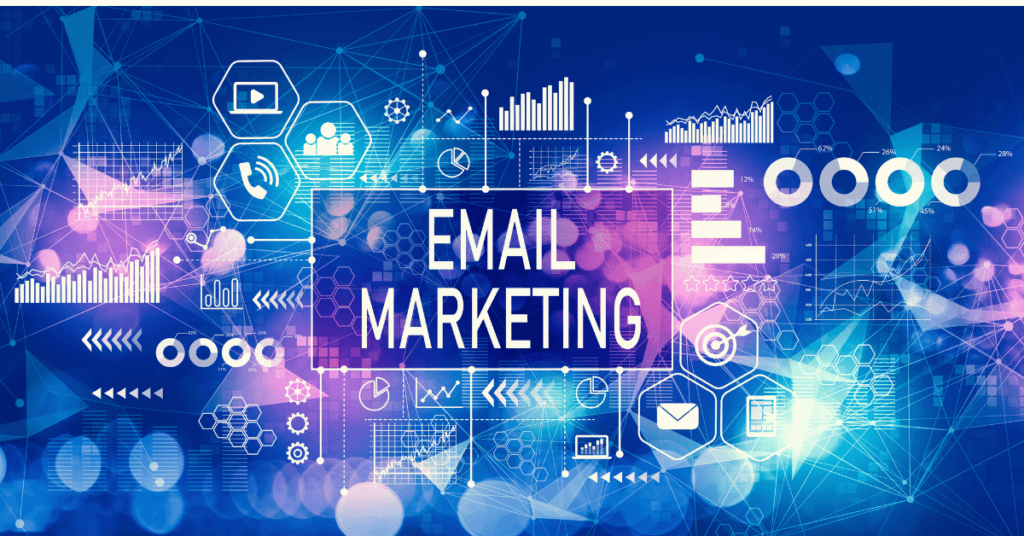AI in Email Marketing: Your Future Ally, Not Replacement
What is Email Marketing?
Email marketing is a powerful tool that businesses use to connect with their audience and promote their products or services. It involves sending emails to a list of subscribers who have given their permission to receive them.

Here are some of the benefits of email marketing:
- Cost-effective: Email marketing is a relatively inexpensive way to reach a large audience.
- Measurable: You can track the results of your email campaigns to see what’s working and what’s not.
- Targeted: You can segment your email list and send targeted messages to different groups of people.
- Personalizable: You can personalize your emails to make them more relevant to your subscribers.
- Automated: You can automate your email campaigns to save time and effort.
Here are some of the different types of email marketing:
- Promotional emails: These emails are used to promote products or services.
- Transactional emails: These emails are sent to confirm purchases, provide account updates, and so on.
- Newsletter emails: These emails are used to share news and updates with subscribers.
- Welcome emails: These emails are sent to new subscribers to welcome them to your list.
- Abandoned cart emails: These emails are sent to remind people who have abandoned their shopping carts to complete their purchase.
Here are some tips for getting started with email marketing:
- Build a strong email list.
- Get permission from your subscribers before sending them emails.
- Segment your email list.
- Personalize your emails.
- Use a strong subject line.
- Make your emails easy to read and scan.
- Include a call to action.
- Track your results and make adjustments.
Email marketing can be a valuable tool for businesses of all sizes. By following these tips, you can create email campaigns that reach your target audience and achieve your marketing goals.
How AI tools are beneficial in Email Marketing?
AI tools offer a treasure trove of benefits for email marketing, making it more efficient, impactful, and ultimately, more profitable. Here are some key ways these tools shine:
Personalization Powerhouse:
- Hyper-targeted content: AI analyzes vast data sets, understanding each subscriber’s preferences, purchase history, and website behavior. This allows AI tools to tailor email content, product recommendations, and offers to individual interests, leading to highly relevant and engaging messages. Imagine an email with your favorite sneaker model in your preferred size or travel deals curated based on your browsing history.
- Dynamic email design: AI can dynamically generate email content, including text, images, and videos, that adapt to each recipient. This could mean showcasing different product variations based on past purchases or displaying visuals that resonate with the recipient’s demographics.
Time-Saving Automation:
- Campaign scheduling and A/B testing: Repetitive tasks like sending emails at optimal times or conducting A/B tests to determine the best subject lines or content can be automated by AI tools. This frees up your time for more strategic tasks like crafting compelling marketing messages.
- Triggered email sequences: AI can trigger automated email sequences based on specific subscriber actions, such as abandoning a cart or downloading an ebook. This ensures timely and relevant communication, keeping your brand top-of-mind.
Improved Deliverability and Performance:
- Spam detection and prevention: AI analyzes email content and identifies potential spam triggers, helping you avoid landing in unwanted folders. This ensures your emails reach real people and improves your sender reputation.
- Data-driven insights and optimization: AI tools provide detailed analytics on campaign performance, such as open rates, click-through rates, and conversion rates. This data allows you to identify what’s working and what’s not, enabling you to optimize your future campaigns for better results.
Enhanced Customer Experience:
- Personalized interactions: AI-powered personalization fosters stronger relationships with customers by making them feel valued and understood. Receiving relevant and timely communication strengthens brand loyalty and encourages repeat business.
- Streamlined customer journeys: AI can automate and personalize communication across different touchpoints, such as website visits, email interactions, and social media engagement. This creates a seamless and consistent customer journey, improving overall satisfaction.
Remember: AI is a powerful tool, but it’s not a magic wand. It’s crucial to use it strategically alongside your own creative thinking and marketing expertise. By leveraging AI’s capabilities while maintaining a human touch, you can unlock the full potential of email marketing and achieve remarkable results.

AI Tools in Action: A Deep Dive into Your AI Tools for Email Marketing
Thanks for providing those specific headings! Let’s break down how AI tools can be implemented in each area of email marketing:
Email Personalization and Segmentation:
- Phrasee: Uses AI to personalize subject lines, content, and offers based on individual demographics and behavior.
- Mailchimp AI: Recommends personalized product suggestions and segments your audience based on purchase history and website interactions.
- ActiveCampaign: Offers dynamic content blocks that change depending on subscriber data, creating a personalized experience.
- Striml: Generates personalized video emails based on individual preferences and actions.
- Sendinblue: Helps segment your audience and automate personalized email sequences based on triggers like birthdays or website visits.
- Klaviyo: Uses AI to predict customer behavior and send personalized emails at the right time for maximum engagement.
- Automizy: Personalizes email journeys based on individual actions and interactions with your brand.
- Emarsys: Provides AI-powered personalization recommendations across all marketing channels, including email.
- Remarkety: Uses AI to personalize abandoned cart emails and product recommendations based on browsing history.
- Motiva: Analyzes customer data to personalize email content and optimize send times for increased engagement.
Subject Line Optimization:
- Einstein Copy (Salesforce Marketing Cloud): Uses AI to generate and test different subject lines, recommending the one most likely to drive opens.
- SendGrid Smart Subject Lines: Analyzes your email content and suggests data-driven subject lines for improved open rates.
- Headliner: Creates catchy and engaging subject lines based on your keywords and target audience.
- CoSchedule Headline Studio: Offers AI-powered suggestions and tests different headlines to find the one that resonates best with your audience.
- Unbounce Call to Action: Provides AI-driven recommendations for effective call to action text in your emails.
- Portent Content Idea Generator: Helps brainstorm email subject lines and other marketing copy ideas.
- SubjectLine.com: Analyzes your subject line and provides predictions on its open rate potential.
- Squirrl: Generates multiple subject line options based on your email content and target audience.
- CopyWrightMailmeteor: Uses AI to suggest effective subject lines and email copy based on your campaign goals.
Content Creation and Copywriting:
- ShortlyAI: Generates different creative text formats from a short description, including email drafts.
- JasperCopy.ai: Writes high-quality email copy and subject lines based on your input and target audience.
- INK: Creates personalized email content and product descriptions tailored to individual recipients.
- Writesonic: Uses AI to write email copy, subject lines, and other marketing materials.
- Artificially: Generates email content, ads, and other marketing copy based on your specifications.
- Rytr: Offers a variety of AI-powered writing tools, including email copywriting and subject line generation.
- Anyword: Analyzes your target audience and creates persuasive email copy for increased engagement.
- ShortlyAI: Analyzes your email content and suggests improvements for grammar, clarity, and engagement.
- Wordtune: Rewrites sentences and paragraphs in different styles and tones, making your email copy more impactful.
Spam Filtering and Deliverability Optimization:
- MailboxValidator: Verifies and cleans your email list to improve deliverability and avoid spam traps.
- SendGrid Email Deliverability: Analyzes your sending practices and provides recommendations to improve your email deliverability.
- DeBounce: Verifies email addresses and removes invalid ones from your list to prevent bounces and improve sender reputation.
- NeverBounce: Offers advanced email verification and list cleaning services to ensure high deliverability rates.
- EmailListVerify: Verifies and cleans your email list to avoid spam flags and improve deliverability.
- SendX: Provides email deliverability monitoring and insights to help you optimize your sending practices.
- CleanList: Offers various email verification and list cleaning services to improve deliverability and engagement.
- Email Octopus: Helps maintain a clean email list and provides tools to improve deliverability.
- SMTP.com: Offers a reliable and secure email delivery platform with advanced deliverability tools.
- Mailmodo: Analyzes your sending practices and provides recommendations to improve your email deliverability
A/B Testing and Campaign Optimization:
- ConvertKit: Offers A/B testing for subject lines, email content, and send times to optimize your campaigns for conversions.
- ActiveCampaign: Provides built-in A/B testing tools and automation features to optimize your email sends and engagement.
- Mailchimp: Includes A/B testing for subject lines and content blocks, allowing you to experiment and find the best performing elements.
- Klaviyo: Offers advanced A/B testing and segmentation features to personalize your email campaigns and maximize ROI.
- Drip: Provides A/B testing for various email elements, along with automation and analytics tools to optimize your campaigns.
- HubSpot: Offers email A/B testing alongside marketing automation and CRM features for a holistic approach to campaign optimization.
- Autopilot: Helps you A/B test different aspects of your email campaigns, including subject lines, content, and send times.
Predictive Analytics and Segmentation:
- Phrasee: Uses AI to predict customer behavior and preferences, allowing you to personalize your email content and segmentation.
- Einstein Copy (Salesforce Marketing Cloud): Analyzes customer data and predicts the best timing for sending emails for optimal engagement.
- ActiveCampaign: Provides AI-powered predictive analytics to segment your audience and personalize your email campaigns based on future behavior.
- Automizy: Uses AI to predict customer actions and trigger personalized email sequences at the right time.
- Motiva: Analyzes customer data and predicts future behavior, allowing you to personalize your email marketing and maximize engagement.
- Omnisend: Offers AI-powered segmentation and automation tools to personalize your email campaigns and drive conversions.
- Klaviyo: Uses AI to predict customer purchases and send triggered email sequences based on their behavior.
- Remarkety: Predicts customer churn and sends targeted email campaigns to win them back.
- Mailchimp AI: Recommends personalized product suggestions and segments your audience based on predicted future actions.
Chatbots for Email Interaction:
- Drift: Integrates a chatbot within your emails to answer customer questions and provide real-time support.
- Intercom: Offers a conversational marketing platform with features like email embedded chatbots for personalized engagement.
- ManyChat: Creates AI-powered chatbots for various platforms, including email, to automate customer interactions.
- Botsify: Builds chatbots for email, websites, and social media channels to provide self-service support and lead generation.
- Helpshift: Integrates chatbots within your emails to resolve customer issues and improve support efficiency.
- Zendesk Chat: Offers live chat features and chatbot integration for emails to provide seamless customer support.
- Freshdesk Chat: Enables real-time email chat interactions with customers through AI-powered chatbots.
- Pure Chat: Provides a simple and customizable chatbot solution for email and other channels to improve customer engagement.
- HubSpotMoEngage: Offers email embedded chatbots powered by AI to personalize customer interactions and improve lead generation.
Real-time Engagement and Personalization:
- Phrasee: Updates email content in real-time based on the recipient’s location, weather, or other dynamic factors.
- ActiveCampaign: Provides real-time personalization features to tailor email content based on individual actions and behavior.
- Striml: Generates personalized video emails that react to the recipient’s actions and update in real-time.
- Automizy: Triggers personalized email sequences based on real-time customer behavior and interactions.
- Motiva: Uses AI to personalize email content and send triggered emails based on real-time events and customer actions.
- CloudSponge: Integrates dynamic content blocks into your emails to personalize content based on real-time data.
- Klaviyo: Offers real-time personalization features to tailor email content and timing based on individual behavior.
- Remarkety: Triggers personalized abandoned cart emails in real-time based on browsing and purchase behavior.
- Omnisend: Provides real-time personalization features to update email content and send triggered emails based on customer actions.
- Mailchimp AI: Recommends personalized product suggestions and sends triggered emails based on real-time customer data.
Remember, these are just a few examples of the many AI tools available for email marketing. The best approach is to consider your specific needs and goals when choosing the right tools for your campaigns.
Is AI technology a replacement for Email Marketing?
While AI is transforming email marketing, it’s not destined to replace human teams entirely. Instead, it’s poised to become a powerful collaborator, enhancing the capabilities of marketing professionals and driving better results. Here’s why:

AI’s Strengths:
- Automation and Efficiency: AI excels at handling repetitive tasks like data analysis, A/B testing, and personalized content generation. This frees up valuable time for humans to focus on strategic planning, creative storytelling, and relationship building.
- Data-Driven Insights: AI crunches massive amounts of customer data, revealing hidden patterns and predicting future behavior. This intelligence fuels informed decision-making, leading to more targeted campaigns and better engagement.
- Personalization at Scale: AI personalizes content and experiences for individual subscribers at scale, something human teams struggle with in large campaigns. This fosters deeper connections and increases the effectiveness of every interaction.
Human Indispensability:
- Creativity and Strategy: The human mind remains unmatched in devising insightful campaign concepts, crafting compelling narratives, and understanding the nuances of brand voice. AI can assist with execution, but human creativity is the driving force behind impactful campaigns.
- Emotional Connection: Building trust and loyalty with customers requires empathy, emotional intelligence, and the ability to adapt to unforeseen situations. These are inherently human qualities that AI currently lacks.
- Big-Picture Thinking: Humans excel at seeing the bigger picture, understanding brand goals, and aligning email marketing with broader marketing strategies. AI can optimize individual campaigns, but humans ensure these efforts contribute to the overall vision.
The Symbiotic Relationship:
The future of email marketing lies in a harmonious partnership between humans and AI. Imagine:
- Marketers leverage AI-powered analytics to identify high-potential segments and personalize content at scale.
- AI automatically triggers timely and relevant email sequences based on customer behavior, while human teams craft the impactful story within each message.
- AI handles A/B testing and optimization, enabling humans to make informed decisions about campaign direction and focus on strategic adjustments.
This collaboration unlocks the strengths of both AI and humans, resulting in smarter, more effective, and deeply personalized email marketing that drives meaningful business results.
In conclusion, AI is not a replacement for email marketing teams, but a powerful tool to augment their abilities. By embracing this collaboration, marketers can create a future of hyper-personalized, data-driven, and customer-centric email marketing that reaches unprecedented levels of engagement and success.
AI in Email Marketing: Revolutionizing Engagement, Not Replacing Humans
The landscape of email marketing is experiencing a seismic shift fueled by the potent capabilities of artificial intelligence (AI). Gone are the days of generic blasts and one-size-fits-all messaging. AI is now woven into the fabric of successful campaigns, ushering in an era of hyper-personalized engagement and unprecedented results. But is this a takeover by robots, leaving human marketers jobless? Absolutely not! Instead, AI emerges as a powerful collaborator, enhancing human strengths and driving campaign effectiveness to unimaginable heights. Let’s delve deeper into how AI is transforming email marketing, explore real-world success stories, and unveil the ethical considerations and future trends shaping this revolution.
Unleashing the Power of AI: From Automation to Personalization
- Repetitive tasks fade away: Imagine saying goodbye to the tedious chores of data analysis, A/B testing, and personalized content generation. AI tackles these head-on, freeing up your marketing team’s valuable time for crafting compelling narratives, building strategic campaigns, and fostering genuine customer connections. Tools like Phrasee and Einstein Copy analyze data and predict customer behavior, empowering you to personalize subject lines and content for maximum impact.
- Data whispers insights: No longer a cacophony of numbers, customer data becomes a symphony of understanding with AI at the helm. Platforms like Mailchimp AI and ActiveCampaign crunch vast amounts of information, revealing hidden patterns and predicting future behavior with uncanny accuracy. This intelligence fuels data-driven decisions, leading to targeted campaigns that resonate deeply with individual subscribers.
- Personalization perfected: Say goodbye to generic messages and hello to tailored experiences. AI makes hyper-personalization a reality, delivering messages that feel like one-on-one conversations. Tools like Striml generate personalized video emails based on individual preferences, while Automizy triggers relevant email sequences based on real-time customer behavior. This fosters deeper connections, increases engagement, and boosts conversion rates like never before.
Case Studies: Where AI Drives Measurable Impact
- Nestlé boosts open rates by 20%: Using Phrasee’s AI-powered subject line optimization, Nestlé personalized subject lines for different customer segments, resulting in a 20% increase in open rates and a significant lift in sales.
- Adidas personalizes product recommendations: Leveraging Mailchimp AI’s product recommendation engine, Adidas saw a 35% increase in click-through rates on their email recommendations, directly driving higher sales and customer satisfaction.
- Sephora nurtures loyalty with AI-powered journeys: Implementing ActiveCampaign’s automated email sequences based on customer behavior, Sephora increased their customer retention rate by 15%, demonstrating the power of personalized nurture campaigns.
Beyond the Benefits: Navigating the Ethical Landscape
While AI boasts immense potential, ethical considerations must be addressed. Privacy concerns, potential bias in algorithms, and the risk of manipulative tactics can overshadow its benefits. Here’s how to navigate this landscape responsibly:
- Transparency is key: Be transparent about how you use AI in your email marketing and ensure data privacy is a top priority.
- Fight bias, embrace diversity: Use diverse datasets and regularly audit algorithms to prevent unintentional bias and ensure fair representation.
- Prioritize human control: AI should always be a tool to empower, not replace, human decision-making. Maintain human oversight to ensure ethical messaging and avoid manipulative tactics.
A Glimpse into the Future: Where AI and Humans Collaborate
The future of email marketing lies not in replacing humans with AI, but in a harmonious partnership where both strengths are leveraged for maximum impact. Imagine this:
- Marketing teams identify high-potential segments with AI-powered data, then craft personalized narratives and experiences that resonate with each audience.
- AI automatically triggers relevant email sequences based on customer behavior, while human teams ensure the content resonates emotionally and builds trust.
- A/B testing and optimization are handled seamlessly by AI, allowing humans to focus on strategic adjustments and campaign direction.
This collaboration unlocks the power of both AI and humans, resulting in smarter, more effective, and deeply personalized email marketing that drives meaningful business results.
Actionable Tips to Get Started with AI in Your Email Marketing
Ready to embrace the AI revolution? Here are some practical steps:
- Explore AI tools: Familiarize yourself with a variety of platforms like Phrasee, Einstein Copy, Mailchimp AI, and ActiveCampaign. Compare features, pricing, and ease of use to find the right fit for your needs. You can also explore broader platforms like Klaviyo, Omnisend, and HubSpot that offer a range of AI-powered features alongside traditional email marketing capabilities.
- Start small: Don’t try to overhaul your entire strategy overnight. Begin by incorporating AI into specific areas, such as subject line optimization or personalized product recommendations. Choose areas where you can easily measure the impact and gain confidence before expanding your use of AI.
- Measure and iterate: Track the impact of your AI-powered initiatives. Analyze results, such as open rates, click-through rates, conversion rates, and customer engagement metrics. Use these insights to adapt your approach and continually optimize your campaigns for better performance.
- Stay informed: Subscribe to industry publications and attend conferences to learn about the latest advancements in AI-powered email marketing. Stay ahead of the curve and discover new tools and strategies to leverage the full potential of AI.
- Seek guidance: Don’t hesitate to seek help from experts. Many AI-powered email marketing platforms offer training resources and support services. You can also consult with marketing agencies or consultants who specialize in AI implementation.
Remember, AI is not a magic wand. It’s a powerful tool, but its success hinges on effective implementation and collaboration with human expertise. By following these tips, you can begin to harness the power of AI and unlock the true potential of your email marketing campaigns.

Conclusion:
The future of email marketing is not a battle between humans and AI, but a beautiful dance of collaboration. Embrace AI as your powerful ally, a tool that amplifies your creativity, automates tedious tasks, and delivers hyper-personalized experiences for your customers. By leveraging AI’s intelligence and retaining your human touch, you can unlock groundbreaking engagement, skyrocketing conversions, and a deeper connection with your audience. Remember, AI is not a magic wand, but a tool to wield with purpose and responsibility. Embrace the ethical considerations, measure your results, and stay informed to truly unlock its potential. Are you ready to step into the future of email marketing, hand-in-hand with AI?
Final Takeaways:
- AI automates repetitive tasks, freeing up your time for strategic planning and creative storytelling.
- AI analyzes data to reveal hidden insights and predict customer behavior, enabling targeted campaigns.
- AI personalizes content and experiences at scale, fostering deeper connections and higher engagement.
- Human expertise remains irreplaceable for crafting compelling narratives, building trust, and seeing the bigger picture.
- The future lies in a harmonious collaboration between humans and AI, driving unprecedented effectiveness.
FAQs About AI Tools in Email Marketing:
- What are AI tools in email marketing?
AI tools use artificial intelligence to automate tasks, personalize content, and analyze data in your email marketing campaigns.
- What are the benefits of using AI in email marketing?
Increased open rates, click-through rates, and conversion rates, improved personalization, and automated repetitive tasks are just some benefits.
- What are some examples of AI tools in email marketing?
Phrasee, Einstein Copy, Mailchimp AI, ActiveCampaign, Klaviyo, Omnisend, and HubSpot are popular platforms with AI features.
- How does AI personalize email content?
AI analyzes customer data, including purchase history, website behavior, and email engagement, to tailor content, product recommendations, and offers to individual preferences.
- Can AI replace email marketing teams?
No. AI is a powerful tool to augment human capabilities, not replace them. Humans still play a crucial role in strategy, creativity, and emotional connection.
- What are the ethical considerations of using AI in email marketing?
Privacy concerns, potential bias in algorithms, and manipulative tactics are important ethical considerations to address with transparency and responsible practices.
- How much do AI tools for email marketing cost?
Costs vary depending on the platform, features, and usage level. Many offer free trials or tiered pricing options.
- What skills do I need to use AI tools in email marketing?
Basic understanding of email marketing and technology is sufficient. Most platforms offer user-friendly interfaces and training resources.
- Can AI help me write my email copy?
Yes, some AI tools can help with subject lines, email copywriting, and generating personalized content based on customer data.
- How can I get started with AI in email marketing?
Research and compare different AI platforms, start small with specific areas like subject line optimization, track results and iterate, and stay informed about the latest advancements.




